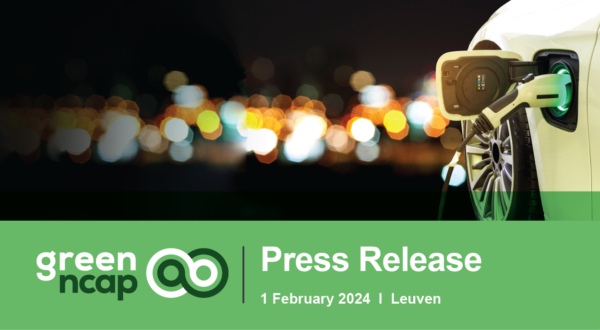
Today, Green NCAP releases its first results for 2024, and the year starts with impressive Green Stars in the Large Family and Small Family categories. As with 2023, Chinese and Electric cars loom large in the line-up, delivering high scores in their environmental performance. For this release, Green NCAP made assessments on the electric Hyundai IONIQ 6, BMW i4, BYD DOLPHIN, MG 4, smart #3, and the petrol mild hybrid BMW 2 Series Active Tourer.
Those drivers who have had their heads turned by the iconic electric Hyundai IONIQ 6, will be feeling justified by the five-star performance of this South-Korean-manufactured car that achieved a total Average Score of 98% in Green NCAP’s environmental rating. Despite weighing in at 2,000 kg, its excellent efficiency values can be attributed to its aerodynamically designed ‘streamliner’ shape, an efficient powertrain, and an effective heating system for colder conditions, which uses a combination of PTC heater, heat pump, and waste heat. The IONIQ 6’s charming competitor in the Large Family Car category, the electric RWD BMW i4 packs a powerful punch on the road yet does not compromise on environmental integrity with a 96% Green NCAP Average Score and a five-star rating, delivering creditable consumption and good thermal comfort for its passengers. Both cars give other more popular carmakers, such as Tesla, something to think about not only in their curb appeal but also in their environmental credentials.
For this release, Green NCAP also evaluated another BMW, the mild-hybrid version of the BMW 2 Series Active Tourer, a stand-out MPV in the Small Family Category. The German manufacturer has set out to win families over with this car’s comfortable ride and manoeuvre, and highly equipped interior. The car achieves a three-star result and a 51% Average Score, which although not equal to the results achieved by battery-electric vehicles, should not be underestimated. Its exhaust system successfully and robustly minimises pollutants and the powertrain goes some way to reduce CO2
emissions.
The remaining vehicles assessed in this release are in the Small Family Category, all-electric and all manufactured in China. The leader of the pack is a car by the Chinese challenger to the European market, BYD, with its third offering onto the European market after the ATTO 3 SUV and the Seal Saloon, the BYD DOLPHIN. This attractively priced electric hatchback achieves a five-star rating and a 98% Average Score in Green NCAP’s assessment. The car has the same heating and air-conditioning system as its stablemate the ATTO 3 (also recently tested by Green NCAP). It achieves low consumption values in different environments including highway and winter conditions. The MG 4 is the first 100% electric hatchback produced by the Chinese automotive manufacturer SAIC Motor under the British MG marque and is similar in size to the DOLPHIN and equally attractively priced. It delivers good consumption values and range in both normal and winter temperatures, scoring five Green Stars and a 95% Average Score. In colder conditions, a PTC heater provides a comfortable driving temperature.
Green NCAP’s final car in this latest set of results is the smart #3, a coupé version of the smart #1 electric SUV, with a sleeker roofline, and slightly longer and wider than its more compact brothers and sisters. This aerodynamic car delivers noteworthy consumption values from an overall setup that boasts a maximum power of 200 kW and a declared battery capacity of 65 kWh. The vehicle manages to offer comfort to its passengers in both cool and warm environments in its default ‘comfort’ driving mode. A PTC heater is used for cabin heating, while better-equipped variants come with an additional heat pump. Overall, it earns five Green Stars and an Average Score of 95%.
This release delivers a small snapshot of the European market and reveals the many options that are becoming available for modern families, interested in lessening their impact on the environment with the car they buy. It is true that many of the vehicles on offer are competitively priced options from the Chinese, but the better-established manufacturers are still making their presence felt with traditional brands such as Hyundai and BMW, delivering vehicles that both spark consumer desire and meet the environmental challenge set by Green NCAP.
— Aleksandar Damyanov, Green NCAP Technical Manager
For full results, visit www.greenncap.com.
For media information, please contact Cordelia Wilson at media@greenncap.com.